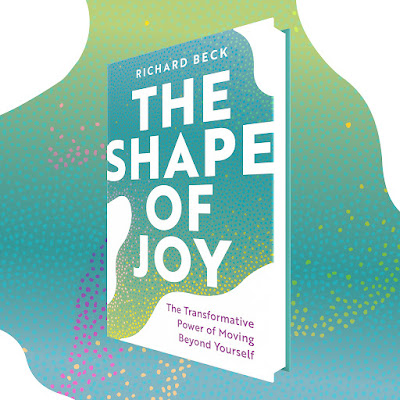The "the mystical to moral shift" concerns what could be called the moralization of salvation. That is, the goal of salvation is to be a good person--kind, loving, and welcoming. You see this moralization everywhere in Christianity, and for good reason. Jesus commanded us to love our neighbors as ourselves, and that people would know we are his followers because of our love. Love is a really, really big deal. But when it comes to salvation, love isn't the only deal.
What are some examples of the moralization of salvation?
One place you see it is in Christological moralization. Jesus lived and died to show us "how to be human." Which is true, but this morally reductive take on Jesus leaves a lot of stuff out (see: the resurrection). You also see this moralization at work in theories of atonement, like the moral influence view. According to the moral influence view of the atonement, Jesus "saves" us by showing us how to love. And again, Jesus most certainly does show us how to love in the cruciform shape of his life and death. But that's not the only way Jesus saves us (see again: the resurrection).
Other places where you see this moralization at work is when the goal of the Christian life is reduced to "being the hands and feet of Jesus" in the world. Again, we are most definitely called to good deeds in and on behalf of the world. As Dietrich Bonhoeffer described it, Jesus is "the man for others." And the church is only the church when it exists "for others." And yet, when the life of the church is reduced in this way, its existence becomes wholly moralized and politicized, as politics increasingly becomes how we express and pursue our moral commitments.
I'll have more to say about the moralization of the church in the next post, for now I just want to observe how moralization leads to disenchantment. Specifically, if the goal of salvation is to be a good person, along with pursuing a virtuous politics, then it quickly become obvious that God, faith, and church are optional for this endeavor, and therefore readily disposable. You can be a loving person, plant a garden, volunteer in your community, create beautiful things, and march in a protest all without God. You can bake bread, make art, hold space, speak truth to power, do the next right thing, resist fascism, write poetry, take a walk, hold your loved ones close, practice gratitude, be mindful, dance, stand in solidarity with the margins, embrace wonder, and make room at the table for others....all without God. Thus, wherever you see Christianity reduced to such things disenchantment soon follows. Which is precisely what we observe as the outcome of Christian "deconstruction," jettisoning God for some beautiful, creative, liberated, inclusive, and joyful vision of "being human."
Let's now map all this onto the moral, existential, and ontological layers of this series.
Salvation gets moralized when it becomes severed from the ontological layer. This is why Christians who deconstruct tend to end up liberal post-modern humanists. "Deconstruction" is the name for ejecting the ontological layer, doubting and questioning the Christian claims about the Real. That God exists, for instance, or that Jesus was raised from the dead. That Judgment Day is coming and that heaven is real. All those ontological beliefs are rejected via "deconstruction." What's left over, at least for a season, is the existential, narrative, and symbolic layer. This is what you find in progressive and mainline Christian spaces, the moral vision couched in the Christian story (the middle existential layer) but without the underlying ontological commitments. Simply put, where mainline Christians demythologized the ontological layer ex-evangelical Christians deconstructed that layer. Either way, demythologized or deconstructed, the ontology of Christianity is jettisoned. Salvation becomes a wholly moral and existential affair.
Now, is this a bad thing?
Well, that'll depend upon your perspective. Personally, I think the moral and political vision of Jesus that you find in progressive Christian spaces is more holistic compared to what you find in evangelical spaces, where "being like Jesus" has been almost completely reduced to being pro-life when it comes to abortion. But again, I lean progressive on these things. That said, I describe myself as a post-progressive Christian because I have serious concerns about the moralization of salvation I've observed in progressive Christian spaces.
What sort of concerns?
One concern is the tendency of progressive Christianity to morph into a spiritual-but-not-religious version of the prosperity gospel. We curate our enchantments--from mindfulness to yoga to manifesting abundance--in order to achieve our best life now. Love means self-care, walking your dog, planting a garden, and voting for Democrats. As I describe in Hunting Magic Eels, there is nothing in this self-curated suite of enchantments that can unsettle or challenge you. Simply because, without the ontological layer, a Reality Larger and Other than your own, there is no capacity for prophetic friction, a location of moral disjunction between yourself and the Ontological Good. The sharp pricks of obligating moral duties are replaced with therapeutic self-affirmation.
But my deeper concern here, as I've argued over the years, is how the Christian vision of salvation is both moral and ontological. As I've pointed out in this series, these two--the moral and the ontological--go hand in hand. Love and resurrection go together. They must if our love is to take on a cruciform, sacrificial shape.
Let me share four observations to make this point.
First, Jesus does "show us how to love" on the cross. But that love would have ended in failure and futility were it not ontologically vindicated by resurrection. In a similar way, calling people to sacrificial love and lifestyles demands ontological commitments. Simply put, heaven must be real. Otherwise, when push comes to shove, the calculus of self-interest will tempt us away from sacrificial hardship. This is a rudimentary observation about human weakness, and yet it is a point so often forgotten by those who wish to retain Jesus' sacrificial ethic of love while jettisoning the ontological beliefs that vindicate the moral severity of that ethic.
Second, and relatedly, as I've described in this series, our commitments to love and justice demand a metaphysics of hope. If love and justice are not going to be eschatologically vindicated, if history is just a cosmic dumpster fire, every effort at improving the world will prove to be vain and futile. Despair, rage, exhaustion, and temptations toward violence will eat away at us like a cancer. Nihilism cannot sustain a commitment to sacrificial love, not durably or broadly.
Third, and still relatedly, salvation isn't just about sin, it's also about death. Death, Scripture teaches us, is our last enemy. These are the Christus Victor perspectives on the atonement. In this sense, the moral influence view of the atonement, common among progressive Christians, has the exact same problem as penal substitutionary atonement common among evangelicals. How so? Both views are moralized visions of the atonement and make no reference to the resurrection. Put simply, neither the moral influence view nor penal substitutionary atonement addresses the problem of death. Both views ignore the ontological layer, how salvation must address human finitude and contingency.
And, finally, life is more than being a good person. Most of the time, it's just trying to keep your shit together. As I describe in The Shape of Joy, we're unwell. What we need, by way of salvation, is a little help. Real, ontological help. A power other than our own that can restore us to sanity. That's how the recovery community puts it. Here's the deal. The progressives are right, salvation is about justice and love. And the evangelicals are also right, salvation is about grace and forgiveness. But salvation is also about power, a power we can turn to when life gets hard, hopeless, desperate. That is what moralized visions of salvation leave out of the picture--the Holy Spirit.
All this is why I've started describing myself as a post-progressive Christian. For the most part, I agree with the progressive vision of the moral and political layer. But I have grave concerns about how progressives have jettisoned the ontological layer through demythologization and deconstruction. My vision, as a post-progressive, is restitching the moral and political layer back to the ontological. Among progressives, I am a town-crier proclaiming the onologization of salvation. God exists. Jesus was raised from the dead. Judgment Day is coming. Heaven is real. Prayers are answered. Miracles happen. The Holy Spirit fills and empowers you. The moral arch of the universe bends toward justice. Love lasts forever. Death, our last enemy, has been defeated. We do not grieve as those who have no hope.















